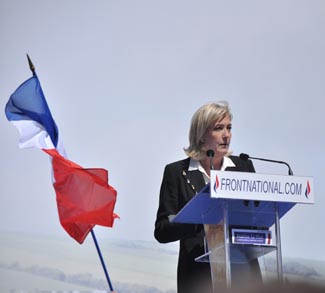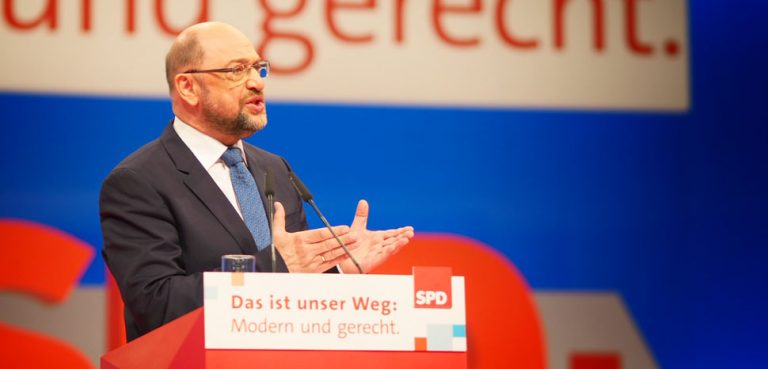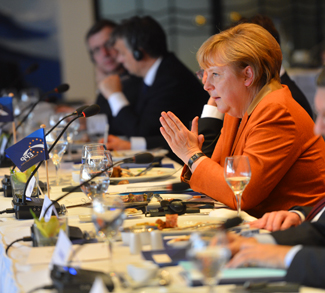Following its strong showing in the first round of France’s regional elections on December 6, The National Front and party leader Marine Le Pen came crashing back to earth last Sunday in the second round of elections. With nearly 28% of the vote nationwide in the first round – more than double its score in the last regional elections in 2010 – the National Front confirmed its status as the “first party of France.” Not only did it succeed in qualifying for the second round in all of France’s thirteen regions. It had the highest vote totals in six regions; and in both the Nord-Pas-de-Calais-Picardie region and the Provence-Alpes-Côte d’Azur (PACA) region, it pulled over 40% of the vote, making the party’s leading personalities, Marine herself and her niece Marion Maréchal-Le Pen, the clear favorites to become presidents of each of those regions respectively. But, in the end, the National Front failed to win any regions and both aunt and niece were defeated by relatively comfortable margins in Nord-Pas-de-Calais-Picardie and PACA.
So, what does this tell us about the prospects of Marine Le Pen in France’s 2017 presidential elections? With the National Front continually increasing its scores from one election to the next and Marine Le Pen persistently polling over 25% and sometimes over 30% in presidential opinion polls, it is regarded as virtually a foregone conclusion that she will qualify for a second round run-off in 2017. But, having gone down to defeat in a region where the National Front is especially strong, can it now be assumed that she will likewise fall short on the national level in 2017?
The answer is: No. The defeat of Marine Le Pen and her party in Nord-Pas-de-Calais-Picardie – like that of Marion Maréchal-Le Pen in PACA – was a function of a peculiar electoral configuration that may or may not be reproduced on the national level in 2017. Even though the Socialists qualified in both regions, the party leadership decided to withdraw from the second round of voting. This decision set up what were, in effect, head-to-head runoffs between the National Front candidates and establishment conservative candidates from Nicolas Sarkozy’s recently re-baptized “Republican” party. In such cases, the establishment conservative candidates will virtually always benefit from the so-called “republican front,” i.e. Socialist voters will largely vote for the establishment conservatives in order to prevent a National Front victory.
The “republican front” is so named, incidentally, for the “republican values” that are supposedly shared by the Center-Right and the Left, but not by the National Front. The decision of Sarkozy’s erstwhile UMP (Union for a Popular Movement) to rename itself “The Republicans” thus caused considerable chagrin among Socialists and other components of the French Left.
But, while Socialists will tend to vote for the establishment conservative candidate in the case of a run-off between the Center-Right and the National Front, it is not the case, conversely, that conservative voters will vote for the Socialist candidate in the case of a run-off between the Socialists and the National Front. Both electoral experience and opinion surveys show that they are more likely either to abstain or even to vote for the National Front candidate. This is hardly surprising, since for most French conservatives the Socialists are as anathema as, per the rhetoric of the “republican front,” the National Front is supposed to be for the French “republican” mainstream as a whole. Indeed, despite the recent tendency of the French media to place the NF outside the political spectrum – thus speaking of “the Left,” “the Right,” and the National Front – the “dirty little secret” of French politics is that there is a real continuity between the electorates of the establishment Right and the National Front.
Now, while it is almost certain that Marine Le Pen will qualify for a run-off in 2017, it is for the moment anybody’s guess who her opponent will be. For the reasons given above, if her opponent is a Socialist – i.e. in all probability current French President François Hollande – her chances of winning remain good. At least two polls (IFOP, September 2014 and Odoxa, April 2015) have shown Le Pen defeating Hollande in a runoff. If, on the contrary, her opponent is an establishment conservative candidate – whether Sarkozy or someone else – Socialist voters will hold their noses more-or-less tightly and vote for the latter, and Le Pen will likely be defeated as she was in Nord-Pas-de-Calais-Picardie.
That being said, if the opponent is Sarkozy, Socialist voters will have to hold their noses tighter and the margin will undoubtedly shrink. If the Socialists are anathema to many French conservatives, Sarkozy is personally anathema to the great bulk of French Socialists. Moreover, it is clear that conservative voters’ disillusionment with Sarkozy as a result of his first term as president is largely responsible for both Hollande’s victory in 2012 and the defection of many conservative voters to the National Front. This is why a 2017 presidential election featuring Sarkozy, Hollande and Le Pen could represent a perfect storm for the National Front. It is also why Alain Juppé, Sarkozy’s chief rival among “the Republicans,” could turn out to be, as the French say, l’homme providentiel or “savior” of the French political establishment. Despite being widely derided as a political “mummy,” the 70-year-old Juppé, who was already briefly prime minister some twenty years ago, is a more palatable option for Socialists.
Returning to last Sunday’s regional elections, it is worth underscoring the lengths to which the Socialist Party was willing to go in order to stop the National Front from winning any regions. Media coverage of the elections created the impression that they were direct elections of regional “presidents,” thus akin to French presidential elections on a national level. In fact, however, they were elections for regional councils, based on a proportionate system, with the membership of the councils then electing the presidents. Extra seats awarded to the party or, in some cases, coalition of parties garnering the largest number of votes practically assures that the latter will dispose of a majority. Technically, the apparent “presidential” candidates – like Marine Le Pen in Nord-Pas-de-Calais-Picardie and Marion Maréchal-Le Pen in PACA – were in fact just the first candidates on the electoral lists proposed by their respective parties or coalitions.
As a consequence of having withdrawn their electoral lists in Nord-Pas-de-Calais-Picardie and PACA, the Socialists will thus have no representation at all in these two regions. This is why renegade Socialist Jean-Pierre Masseret refused to follow the party leadership’s directives and likewise to withdraw the electoral list that he headed in the so-called Grand-Est region. In the end, Masseret’s list garnered a mere 15.5% of the vote, securing only 19 of the 169 seats comprising the regional council. But, as Masseret told France’s LCI news television, “Nineteen is better than zero.”
It is widely believed on the French Right – and in part admitted on the French Left – that former French president François Mitterrand facilitated the rise of the National Front in the 1980s, in order to siphon off votes from the institutional Right and permit the Socialists to continue to govern despite flagging popular support. What Mitterrand could not have foreseen is that one day the National Front would become so strong as to represent a threat to the inheritors of his own legacy.
John Rosenthal is a guest contributor to Geopoliticalmonitor.com, and author of The Jihadist Plot: The Untold Story of Al-Qaeda and the Libyan Rebellion. You can follow him on Facebook here.




